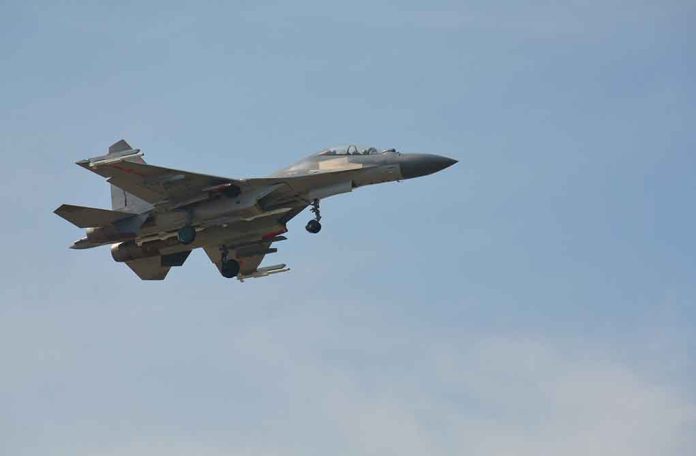
President Trump’s unambiguous promise to use force when necessary to defend America and its allies sends shock waves through Europe as NATO partners face a stark choice: increase defense spending or potentially lose US protection.
Key Takeaways
- President Trump has declared he “will never hesitate” to use American power to defend the US and its partners, while emphasizing his priority is ending conflicts rather than starting them.
- European security experts warn that a US withdrawal from Europe could be as destabilizing for the EU as a nuclear attack by Russia.
- Two potential scenarios are emerging: “Tit for Tat” where America leverages threats of abandonment to secure more defense spending, or “So Long Europe” where the US strategically disengages to focus on China.
- The EU is being advised to rapidly increase defense budgets, develop collective military capabilities, and prepare for conventional deterrence without US support.
Trump’s Unwavering Commitment to Defense
During his address to troops at Al Udeid Air Base in Qatar as part of a multi-day tour of the Gulf region, President Trump reaffirmed his administration’s defense posture with crystal clarity. While maintaining his well-established priority of ending conflicts rather than initiating them, Trump left no ambiguity about America’s readiness to protect itself and its allies. This balanced approach reflects his consistent foreign policy doctrine that combines strength with restraint, ensuring adversaries understand there will be consequences for threatening American interests or those of our partners.
Trump’s commitment to military readiness is also reflected in his recent announcement of substantial pay raises for US troops, demonstrating that his America First policy includes properly compensating those who serve. This combination of strong defense capabilities and proper compensation for service members forms the backbone of Trump’s national security strategy, ensuring America maintains both the will and capability to defend itself and its allies from aggression. The message is clear: America stands ready, but prefers peace through strength.
𝗢𝗽𝗶𝗻𝗶𝗼𝗻: 𝗡𝗭 𝗺𝘂𝘀𝘁 𝗶𝗻𝘃𝗲𝘀𝘁 𝗶𝗻 𝗱𝗲𝗳𝗲𝗻𝗰𝗲 𝗼𝗿 𝗿𝗶𝘀𝗸 𝗶𝘀𝗼𝗹𝗮𝘁𝗶𝗼𝗻 𝘄𝗶𝘁𝗵 𝗧𝗿𝘂𝗺𝗽 𝟮.𝟬
The following op-ed is by ACT MPs Mark Cameron and Laura McClure.
With Donald Trump heading back to the White House next week, much discussion has focused…
— ACT New Zealand (@actparty) January 14, 2025
European Anxiety Over America’s Defense Commitment
European security analysts are increasingly concerned about the implications of Trump’s demand that NATO allies meet their defense spending obligations. According to a report from the European Union Institute for Security Studies, a US withdrawal from Europe could prove as destabilizing for the EU as a nuclear attack by Russia. This stark assessment highlights the existential dependency European nations have developed on American military protection, a situation President Trump has consistently criticized as unfair to American taxpayers who effectively subsidize European security while many NATO members fail to meet even minimum defense spending requirements.
“We can’t rule out the possibility that America might say “no” to Europe on issues that threaten it,” said President Zelenskyy
Security experts have outlined two potential scenarios that may unfold. In the “Tit for Tat” scenario, the Trump administration would use the threat of abandonment as leverage to pressure European countries to substantially increase defense spending, with preference given to American weapons systems and assets. This approach would also likely include demands for concessions in trade and technology sectors. The second, more drastic “So Long Europe” scenario envisions a strategic retrenchment from Europe as America pivots resources toward addressing the China challenge, potentially leaving Europeans to handle regional conflicts without substantial US backing.
A Wake-Up Call for European Self-Defense
The EU is being advised to prepare for both scenarios by investing heavily in a robust European deterrent force. Recommendations include significantly enhancing defense spending across all member states, developing collective military capabilities that don’t rely on American assets, and preparing for conventional deterrence operations. This represents a radical departure from decades of European complacency on defense matters, during which many nations allowed their military capabilities to atrophy while relying on American protection. President Trump’s policies are effectively forcing Europe to grow up and take responsibility for its own security.
Security experts specifically suggest the EU should support member states in increasing defense budgets while developing critical strategic enablers like airlift capabilities and intelligence assets. Additionally, the EU must enhance its capacity to absorb both hybrid and conventional attacks and dramatically scale up weapons production to maintain security in a potential future without US support. This represents the most significant restructuring of European defense thinking since the formation of NATO, prompted by President Trump’s insistence that alliance members meet their obligations rather than free-riding on American security guarantees.
America First Means Partners Must Step Up
President Trump’s approach to international security partnerships represents a fundamental rebalancing of responsibilities between America and its allies. Rather than weakening these relationships, Trump’s policies aim to strengthen them by ensuring all parties contribute their fair share to collective defense. This tough love approach has already shown results, with NATO Secretary General reporting increased defense spending among alliance members. By making clear that American support is contingent on reciprocal effort, Trump is creating more sustainable security partnerships that don’t unfairly burden American taxpayers while encouraging allies to develop their own robust defense capabilities.
As Trump continues his diplomatic engagements, the message remains consistent: America stands ready to defend its interests and those of its partners, but expects those partners to meet their obligations in return. This approach, combining strength with fairness, ensures America remains the world’s preeminent military power while encouraging a more equitable distribution of defense responsibilities among allies. The result is likely to be a stronger, more resilient network of international partnerships based on mutual respect and shared commitment rather than dependence and free-riding.










